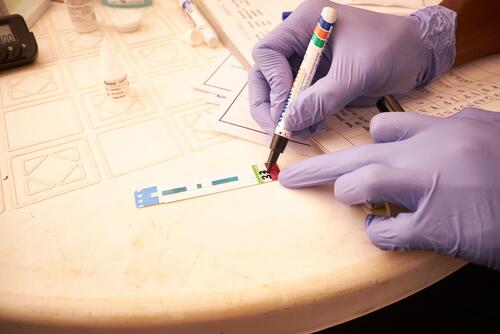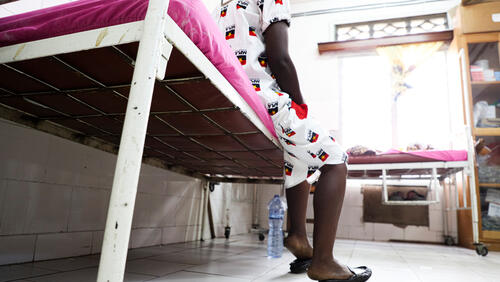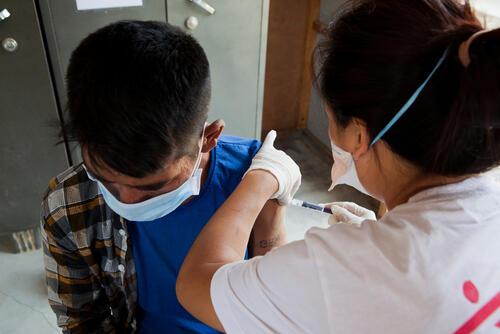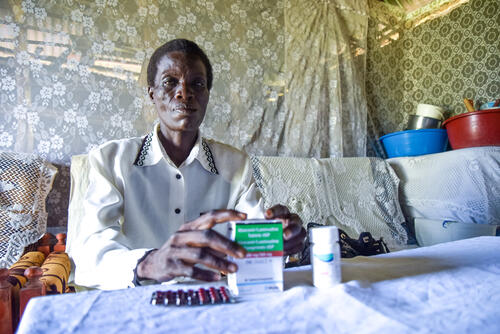Brussels - The UN high level meeting on HIV/AIDS that was held between 8 and 10 June is the fourth UN High Level Meetings on AIDS to occur since the first case of HIV was diagnosed in 1981. While tremendous progress has been achieved over the last 40 years, MSF expresses our disappointment on the final political declaration and are concerned that without strong global and country accountability, and additional resources allocated to interventions with the most impact, we will likely regress in the fight against the disease and lose the gains made. This is particularly true in a moment where most programmes in the HIV response have shown gaps and delays under the COVID-19 crisis.
“The fourth UN Declaration on AIDS is a disappointing step in the fight against this killing disease and very far from what was desperately needed today. While AIDS remains the leading cause of death among adolescent and young African women, Member States have shown the disregard for the lives of so many people by blocking and removing key parts of the first drafts of the declaration on several vital issues,” says Dr Nomkhosi Mavuso, MSF Medical Representative, South Africa.
During the negotiations of the Political Declaration on AIDS over the past few months, the lack of political will among member states to move collectively towards more progressive actions has been evident. Strong language on social determinants of health, prevention, rights and community led responses have been regrettably contested.
“The declaration doesn’t recognise the rights and the urgent needs of some the most vulnerable and marginalised categories of people affected by AIDS and fails to value enough the critical work of communities and civil society organisations in the response. Ironically, powerful countries commit to ending AIDS yet shamefully blocked and, in the final declaration, have deleted or watered-down critical texts addressing intellectual property barriers that would facilitate access to lifesaving medicines, including for co-morbidities and co-infections.”
“In 2021, it is shocking to see Member States blocking access to lifesaving medicines, refusing to acknowledge, nor grant rights for, the most vulnerable and marginalised, and resisting community led responses and leadership,” continues Mavuso.
According to MSF, the political declaration also omits strong language on some of the most deadly gaps and challenges of the response today to reduce mortality. There is no mention of how programmes should address treatment failure, delayed initiation and treatment interruption, all of which lead to advanced HIV disease. Severe bacterial and fungal infections which are, next to TB, the leading causes of morbidity and mortality among people living with HIV, are also not mentioned at all within the text.
“The declaration fails to address why people continue to die from advanced HIV and the leading causes of death: TB but also severe bacterial and fungal infections. The target of reducing HIV deaths below 250,000 by 2025 will simply not be met without interventions to prevent, diagnose and treat advanced HIV disease and addressing delayed start and interruption of care and treatment failure. Member States seem to have forgotten that the previous UNAIDS target of less than 500,000 HIV-related deaths by 2020 has not been achieved and their new commitments are simply very far from the level of the urgency and the mobilisation of resources that this issue would require.”
The Declaration calls for voluntary annual reporting on the progress of implementation of commitments by member states to UNAIDS. However, country reporting must also be coupled with independent monitoring by civil society organisations and communities to hold governments to account on their commitments.
“Without tangible action behind the words of the new HIV global strategy and the political declaration, their implementation may not be sufficient to put the HIV response back on track by 2025. Too many people will be left behind to face HIV without a lifeline and too many people will die,” concludes Mavuso.






